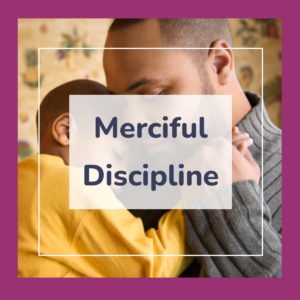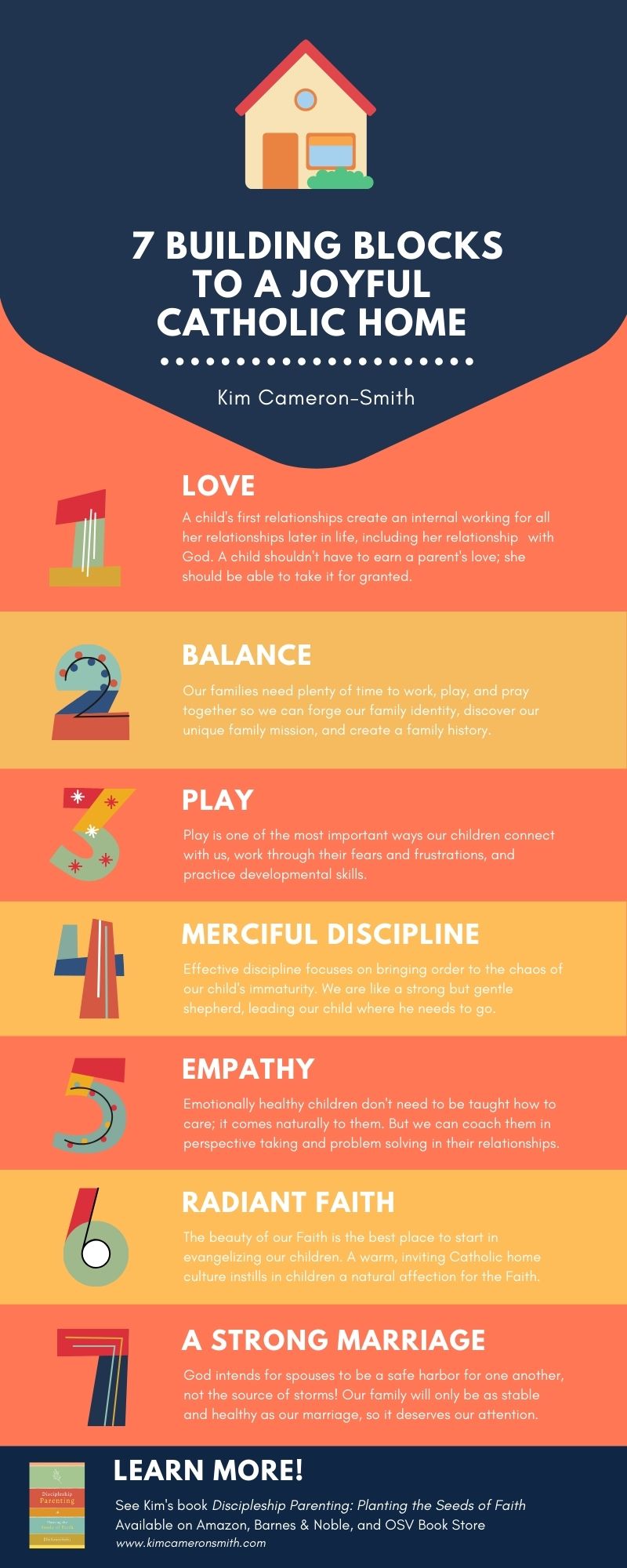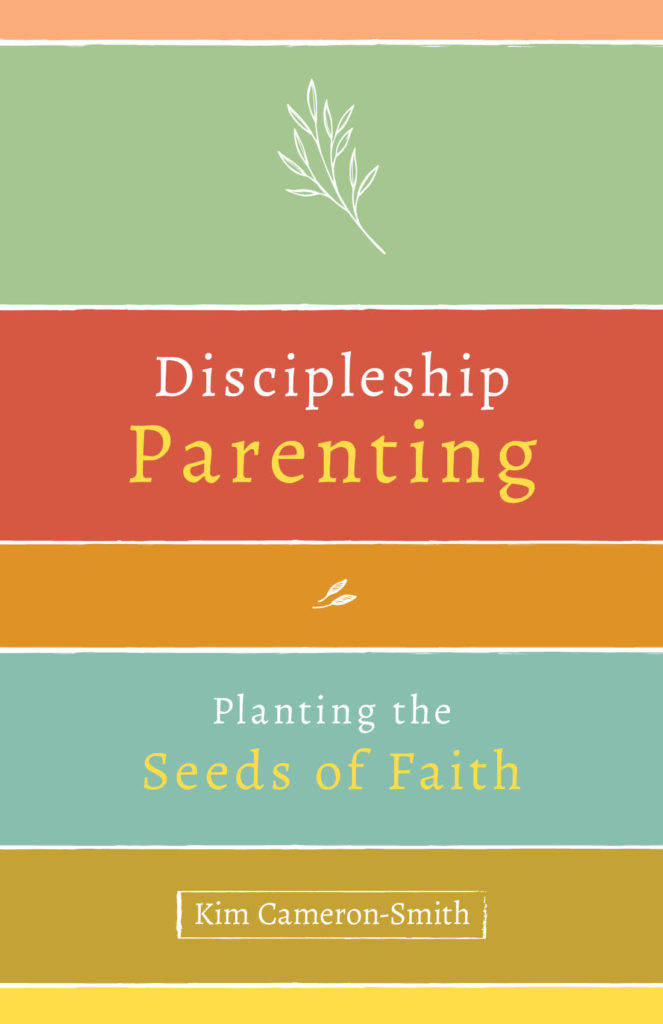Learning Portal
Here are some resources to increase your confidence as an intentional Catholic parent!
Gaining Wisdom
- The virtue of wisdom comes through gaining knowledge and using this knowledge to inform our choices.
- But practice prudence as you seek wisdom! Take your time, and reach out if you have questions.
Getting Started
Basic principles in Catholic parenting: our mission, the obstacles to our mission, and the answer to the obstacles.




What Is Intentional Catholic Parenting?
We all want what is best for our families, but what does that mean exactly? Experience tells us that without a clear vision or sense of purpose, we can become locked into the mindset of the masses, parenting like our friends are parenting or the way we were parented ourselves.
We can parent more intentionally by reflecting on our purpose and mission as Catholic parents.
The Great Commission of Parenting
Every Christian is called to discipleship. Sacred Scripture records Christ’s last words to his disciples before the Ascension: “Go therefore and make disciples of all nations, baptizing them . . and teaching them to observe all that I have commanded you” (Mt. 28:19-20). This is called “the Great Commission.” Christ instructs his disciples to make other disciples just as he made them: by living with them, correcting them, teaching them.
If all Christians are called to make disciples, then the “Great Commission of Parenting” is to evangelize our own children. This is primarily our responsibility. Parents are the “first heralds” of the faith for their children.
Obstacles in Our Mission
We face unprecedented obstacles in transmitting our Faith to our children today.
- Young adults today are twice as likely to describe themselves as agnostic or atheist than young adults thirty years ago.
- Secularism has come to dominate popular culture; God is aggressively shoved to the outermost margins of society.
- At the same time, we’ve witnessed the decreasing relevance and impact of the culture of the Church, which used to inform the everyday lives of the faithful.
- Individualism has fractured parish communities, making it difficult to nourish the lives of the laity, especially kids.

Our Little Seminaries
Despite the obstacles, we have what we need to nourish our children’s faith lives.Our homes serve as a first seminary for our children. The word seminary means “greenhouse,” where tender plants are protected until they’re ready to survive in the harsher conditions outdoors.
We can nourish our home environments so that the seeds of our children’s faith are planted in rich soil where they can germinate and flourish.
Fertile Soil
How do we nourish that soil of faith in our little seminaries? I wrote an entire book answering this question! My book unpacks a plan and structure for creating your little seminary. I call this structure “the 7 building blocks of a joyful Catholic home.”
I talk about the 7 building blocks below and elsewhere on this site. To keep it simple, I believe we can evangelize our children by
- building and protecting trust and connection between ourselves and our children, and
- creating a vibrant Catholic home culture.
You might immediately recognize the importance of #2 here (vibrant Catholic home culture). But why #1? What does trust and connection have to do with evangelizing our kids?
Follow Me
Before we can evangelize our children, they have to want to follow us. If they aren’t following us, we can’t lead them anywhere!
Jesus’ disciples – his inner circle- wanted to follow him; he didn’t kidnap them! Those disciples watched Jesus: they observed how he prayed, how he paced his life, how he interacted with people from many different walks of life. They watched him . . . and they wanted to be like him.
He was their north star.
They were willing to follow him because they trusted and loved him.
In our little seminaries, we must foster this trust and connection between ourselves and our kids because it is the foundation of the discipleship relationship.

A Warm and Confident Lead
Modern parents often over-correct the harsh or authoritarian parenting of previous generations. They want to be warm and accepting. Sometimes, however, they may be so passive that it actually alarms their kids.
Key insight: When parents lead with confidence, their children feel more secure.
The Parent-Child Dance
The relationship between a parent and child is one of caretaking and dependence. When parents inspire their children to depend on them to get their needs met, the children come to rest emotionally and can get on with the developmental tasks of growing up.
Otherwise, the children look to replacement figures for leadership, especially peers and celebrities. Or they may move into a dominant role and begin to orchestrate the relationship – and even the whole house!
Intentional Catholic parents can lead with warmth and confidence – a fantastic combination!
Navigating the Maze
We want to be our child’s north star; we want to be inspiring and confident leaders so we can shepherd our children to Christ.
Yet we come to this task with our own brokenness and incomplete understanding of our Faith. We fall short of our hopes and ideals. Sometimes what we’re doing isn’t working, and we know it.
This is the maze of parenting. Sometimes we’re walking blind or walking into walls.
We are never alone. With Christ as our north star, we can find our way again.
At ICP, we journey together on this road of disciple-making.
The 7 Building Blocks
We know our mission (raise disciples), and we recognize the obstacles to our mission (secularism, passive parenting, loss of Catholic culture). The 7 building blocks protect family connection and children’s hearts, they encourage strong parent leadership, and they recover lost Christian culture, particularly in the home. The building blocks encourage ideal growing conditions in our homes so the seeds of our children’s faith can grow and flourish.
Keep in mind these 7 building blocks as you lead your little seminary, but each family has unique gifts and challenges, so no two homes will be identical. These are gentle reminders of what is most important, but nobody will live the building blocks perfectly.




Love Given Freely
A child’s first relationships create an internal working model for all her relationships later in life, including her relationship with God. We want our children to grow up taking God’s love for granted. This means we want our them to be able to take our love for granted. We don’t want them to believe they have to earn our love.
6 Ways Kids Feel Close to Us
Children are born with a natural yearning to be close to us. As babies, they mostly feel close through their five senses, particularly by being held and fed by us.
As they grow up, in ideal circumstances they become capable of holding on to us and feeling close to us in other ways: through a sense of sameness to us, belonging with us, being significant to us, feeling emotionally close to us, and feeling truly known by us.
These are Gordon Neufeld’s 6 phases or roots of attachment. When we nurture and protect these roots of attachment, it creates a womb of maturation and gives us the ability to lead and care for our children.
Key insight: Children will only follow the people they are attached to.
Perfection Not Required
As somebody with emotional wounds and defenses, I have a heart for parents who fear their mistakes will ruin their children. Parenting more than any other experience brings our brokenness to the surface.
The good news: It’s possible to give our children what we don’t have ourselves, and in the process, we find our own healing.

Time Is a Gift from God
As Catholic parents, we recognize that time is a gift from God. We use our time to glorify him and fulfill his will. Our calendars belong to God! When we are feeling overwhelmed and frazzled, if we reflect on our choices we may realize we are responding to society’s expectations for our family rather than God’s.
Key insight: In reality, we will always have time to fulfill God’s will for us.
Work, Play, and Play in the Catholic Home
Inspired by the monastic tradition, we can strive to balance work, play, and prayer in our homes.
Balanced family living doesn’t mean Mom and Dad do all the work while the kids sit around playing games. Each family member can contribute to the upkeep of the home and meal preparations, as is appropriate for their developmental age. Even very young children enjoy being included in these routines with small jobs, like helping unload the dishwasher, mopping, or dusting.
Simple Not Selfish Living
Living a balanced Catholic family life does not mean we tidy our families away from the world where we’ll never be sullied by the messiness of human experience.
It means we live simply and humbly, allowing time for family connection, prayer, and renewal, so that we’re all better prepared for our mission in the world.

Preserve Free Time
Play is one of the most important ways children connect to us, work through their fears and frustrations, and build their self-confidence. Despite the pressure to fill a child’s schedule with “enrichment” activities, parents can take the lead and preserve free time in their child’s life.
Play Protects the Parent-Child Dance
Playing together as a family builds rapport and protects connection. If our kids seem resistant to family rules and chore routines, sometimes we are too focused on work and not enough on playing together.
You can have play routines in your schedule (game nights, weekend hikes), but this building block also includes our default demeanor in our homes. We can have generally warm, playful attitude with our kids no matter what we’re doing.
Playful parents are able to engage their children with greater confidence, and these children are more willing to lean on and trust the parents. The parent-child dance of caregiving and dependence is works better. Less tripping and more dancing!
Play Reflects God in Us
The inclination to play is not only put there by God, but it reflects God in us!
God must be a great player! Just imagine how much fun he had creating the world. He’s all-powerful; he could have created the world in a snap — a world that was functional, useful, and got the job done. But he took his time, painting the world with shadows and light, with color and texture, dabbing here, speckling there. What a blast!
The imprint of God’s play is all around us, reminding us of his creativity and delight in his creation. And that imprint is on us, too, when we play. By encouraging a child’s play and his growing playful nature, that image of God in him becomes ever more illumined.




Connection First
The heart of effective discipline is the connection between parent and child.
We protect our connection by
- leading with confidence
- nourishing the attachment roots (the six ways of attaching)
- avoiding peer attachment
Without a secure connection, discipline deteriorates into a frustrating power struggle.
See “Getting Started” section.
Shepherding Kids Toward Maturity
“Problem” behavior (especially in very young children) is rarely a sign that a child is bad or damaged. Usually, they’re trying to get a need met, or they’re struggling to express their emotions responsibly because they’re still immature.
On the other hand, sin is real; we want our children to understand how their choices impact their relationships with others, including God.
Using virtue training and positive discipline tools, we can shepherd our children toward maturity while teaching them how to protect their relationships and grow spiritually.
Authoritative v. Authoritarian Discipline
The goal of effective discipline is for the child to build a conscience and self-control, not to break the child’s will or to coerce obedience through threats.
Merciful discipline is not passive or mushy discipline. Mercy is the willingness to enter into the chaos of another’s life to bring them healing. For parents, we enter the chaos of a child’s immaturity to bring greater order (virtue, self-control) to their choices.
Despite stereotypes, children raised with positive discipline techniques by authoritative parents (strong leaders) grow up with greater self-control and self-possession than kids raised with punitive techniques by authoritarian parents (bossy, controlling, harsh).
You can be a warm, gentle parent and still lead with confidence and authority.

Empathy Defined
Empathy is a mark of a mature disciple. Empathy is the gift we use to know another person. It allows us to consider their perspective or to feel what they feel. It helps us recognize a need and want to respond to the need.
Today, children are becoming less empathic, despite “empathy training” in schools.
Emotionally Healthy Kids Don't Need Empathy Training
When children grow up in loving homes, they naturally develop empathy. Emotionally healthy children don’t need to be taught to care; it comes naturally to them in the right circumstances.
But we can coach our children in how to care: how to hold a baby, how to feed a pet, how to see a sibling’s point of view, how to resolve disagreements with a friend.
Nurturing the Caring Brain
The best way to raise an empathic child is to treat her with empathy; this is simple modeling. We tend to treat others the way our attachment figures treat us. We can nurture a child’s “caring brain” by filling her attachment cup to overflowing and being an emotion coach.
What does this mean?
- We fill a child’s attachment cup to overflowing by meeting her attachment needs before the cup is empty.
- We emotion coach by helping her identify her own emotions when she’s struggling and helping her perspective-take in conflicts with siblings and friends.

Evangelize with Beauty
Children are very responsive to beauty, often long before they are capable of comprehending Church teaching. Catholic culture (especially our liturgy, art, and music) is so beautiful; it is a natural source of evangelization and transformation. Fill your home with the sights and sounds of our Faith!
Your family can enjoy a shared faith life that’s alive and radiant, a faith that becomes a tremendous witness to other families of the truth and beauty of Christ’s message.
Areas of Home Faith Practice
As our society becomes increasingly secularized it’s critical that our home cultures become more Christianized. Allow your home to reflect the abundant joy and hope of our Catholic Faith.
Here are some basic areas where you might focus your plans:
- Learn about the Christian virtues together.
- Explore and celebrate feast days and saints days with crafts, tea parties, and sharing books together.
- Develop a family prayer plan and pray together regularly.
- Practice the corporal and spiritual works of mercy alongside your children both within your home and in your community.
We Get What We Are
Catholic sociologist Christian Smith remarked that when it comes to faith transmission “we get what we are.” That is, our children absorb our attitudes about the Faith from us, whether or not we’re aware of it.
More accurately, they absorb what they believe are our attitudes about the Faith, whether or not it’s true. For example, if they never see us praying, they will assume we don’t do it, and they’ll assume it’s not important to us.
On the upside, if we’re excited and enthusiastic about being Catholic, it’ll be contagious! We can help our children see both the obligations and the opportunities of living out our Faith. The heart of our Faith is love and hope, and the opportunity for transformation and renewal.
Particularly as children mature, we can share how our faith helps us navigate hard decisions, survive loss, and gain perspective.


Our Family Is Only as Stable as Our Marriage
Our family will only be as stable and healthy as our marriage, so it deserves our attention.
God intends for spouses to be a safe harbor for one another, not the source of storms!
The Deadly Horsemen of Marriage
Marriage expert John Gottman identifies 4 unhealthy communication habits that are very destructive to our marriages:
- criticism (attacking the spouse’s character instead of focusing on specific issues)
- contempt (eye-rolling, sarcasm)
- defensiveness (erecting a wall of denial)
- stonewalling (icing out the spouse)
Gottman calls these “the four deadly horsemen of marriage,” because they’re so damaging.
It’s interesting to note that after many decades of research, Gottman found that it’s not conflict itself that causes serious marital issues, but rather how the spouses manage the conflict.
We all fall into some of these bad habits occasionally. If we’re aware of how damaging they can be, we can make different choices that actually strengthen our connection to our spouse, even when we are disagreeing!
Our Marriage Is a Model of Love for Our Kids
Our marriage models for our children how to treat others in close, intimate relationships. What do they see?
Hopefully they witness us speaking about and to our spouse with deep regard and love; performing little acts of kindness to make his or her life easier. Hopefully they witness our willingness to serve even in small ways.
You and your spouse are called to help one another on your paths to heaven. See your spouse the way Christ does, as a precious and priceless soul on a journey to a Divine Destination.
FREE
7 Building Blocks Infographic
Perfect to hang up on the fridge for quick reminders!

Learn More about the 7 Building Blocks in Kim’s book!
Discipleship Parenting
Planting the Seeds of faith
Discipleship Parenting provides tons of insights for parents who want to live intentionally with their children!
My book is built around my 7 building blocks and focuses especially on raising spiritually vibrant children in our secularized culture.

Subscribe to ICP Feed
Subscribers to Intentional Catholic Parenting (“ICP”) receive all blog posts and podcasts immediately after release.
ICP subscribers do not receive newsletter content (unless they subscribe to the newsletter separately).
Time commitment: Blog posts take 3-5 minutes to read; podcasts are about 20 minutes long.
Subscribe to Newsletter
“The Anchor and Maze” explores how parents can navigate the maze of parenting while remaining a child’s emotional anchor.
Newsletter subscribers receive links to recent posts, but possibly later than blog subscribers.
Time commitment: I keep the newsletter short. It takes about 1 minute to read.
